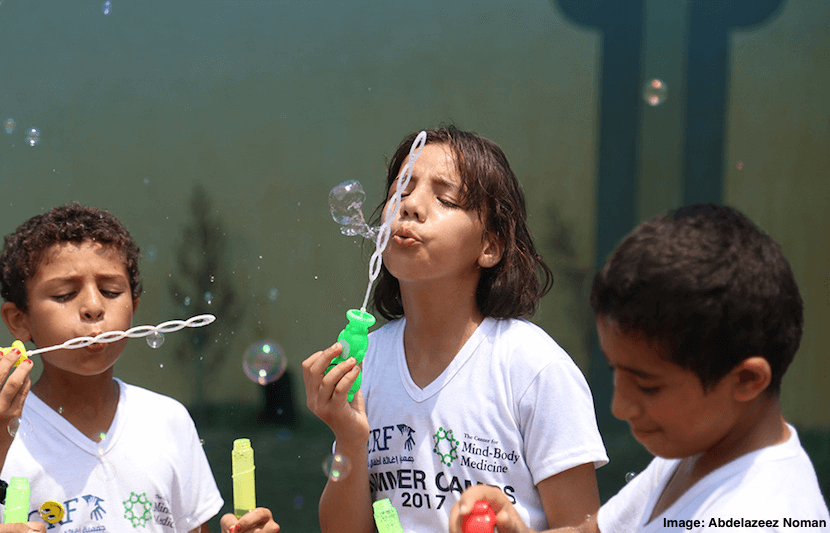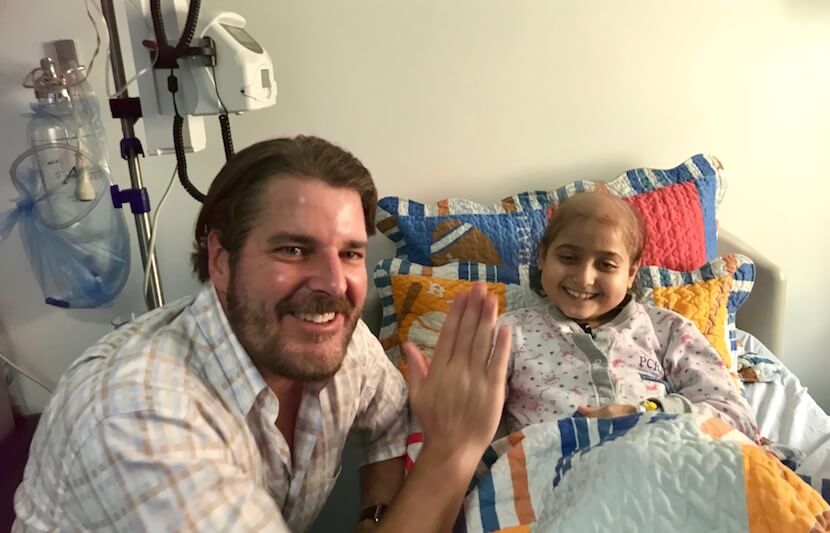Airstrikes over heads, buildings crashing down and kids crying endlessly — one might have thought it was the closest thing to hell on earth and simply walked away.
But for Steve Sosebee, at age 23, his first impression of war-stricken Palestine in the winter of 1988 gave him more the reason to return after finishing his college degree.
Little did he know then that his second trip would make Palestine his home.
Nearly 30 years later, the children of the Middle East are still suffering from the war in which they never played any part.
Now the founder and CEO of Palestine Children’s Relief Fund (PCRF), an organization that sends injured children abroad for free medical care, Sosebee is bringing back hope to these children, one trip at a time.
It all started with two kids
In 1990, during his second trip as a journalist working on a story in the West Bank town of Hebron, Sosebee met a brother and a sister — Mansour, 10, and Sabah, 11, Abu Sneineh — who were seriously injured by a bombing of their house.
He instantly connected with them and leaving them was simply not an option.
“He has a beautiful spirit. He’s just an innocent child,” said Sosebee as he recalled the first time he met the siblings. “For me, it wasn’t really an option to see a child who was without legs and then say, ‘Okay, he’s just going to stay that way the rest of his life.’ ”
When he came back to Akron, Ohio, his hometown, to work as a landscaper just for the summer, Sosebee brought a photograph of the siblings with him. After asking some close friends, he ultimately found an orthopedic surgeon who helped him arrange the care the siblings needed for free.
His friends helped him raise money to take care of the siblings’ visas and plane tickets.
In the spring of 1990, Sosebee brought the siblings to the U.S. to get treated. They were the first Palestinian children to ever go abroad for medical care.
After the siblings and Sosebee returned to Palestine, he started seeing many other children who needed treatment.
“I didn’t have, when I started PCRF, a long-term vision of starting the organization of treating kids consistently. I just wanted to help these two kids. It grew after their treatment into something much bigger,” said Sosebee.
Bigger than imagined
Since it was founded in 1991, PCRF, now with 42 chapters around the world, has sent nearly 2,000 kids from all over the Middle East to the U.S., Europe, different parts of Middle East and India for free medical care.
Although the scope of the work has increased tremendously, Sosebee says the process still remains the same as day one.
Whether reaching out to countries like in Europe with public health sectors or countries like the U.S. with private health sectors, Sosebee says consistency is the key part of his work.
Especially in the U.S. with many private hospitals, the team can appeal to each hospital to take in injured children on a charitable basis.
“We don’t always get positive answers, but if we are consistent, and remember the U.S. is a huge country, there’s lots of opportunities for us to find hospitals all over the country,” he said.
Along with its treatment abroad program, PCRF brings volunteer medical teams from all over the world to treat children in the Middle East. From arranging visas, transportation and accommodation to connecting volunteers with patients, PCRF arranges everything for the mission teams to treat as many children as possible.
According to their website, for the last six years, PCRF helped more than 500 teams to visit the Middle East. Just in 2018, about 225 medical volunteers screened 3,064 patients and operated on 1,205 patients.
“We’re one of the few organizations who’s on the ground and having this kind of impact in the health sector,” said Sosebee.
Strengthening the locals
Although outside help is crucial, PCRF is aware of the importance of strengthening the local medical services.
But, there are two big problems. First, it’s hard to find local doctors to train because many of them either go to private sector or to other countries like Saudi Arabia, Qatar or Europe for better pay.
“You know this is not a very pleasant place to live if you’re a very educated and well-trained person,” said Sosebee.
Even when they do find doctors to train, it’s very hard to work with the Palestine Ministry of Health, which provides only short-term solutions to the growing number of injured and sick civilians.
But, as always, for Sosebee, leaving the problem “as is” is simply not an option.
In 2012, to honor the sudden death of his wife Huda al Masri, who played a vital role in the organization as a social worker, PCRF built the first and only public cancer department for children in Palestine in the West Bank town of Bethlehem.
Currently, PCRF is building its second cancer department in Gaza, which will be opened next month, and starting a new project to build a pediatric intensive care unit.
“It is our goal to train people here and give them the experience and opportunities to improve, so they can be independent and self-sufficient in providing those services to their own patients,” said Sosebee.
Purpose-driven life
However passionate he may seem now, Sosebee recalls when he felt unsure of his purpose in life. Even when he was working as a journalist and helping the siblings, he couldn’t quite understand what it all meant.
“I was so young. I was in my early twenties and I had these brother and sister from Palestine with me, taking care of them. And I didn’t know what I was doing. So every mistake I made, or every decision that was made, felt like such a big one,” he said.
Fortunately, as he kept responding to where his heart led him, he found an answer. From experience, he knows everyone else will also find their own, if they keep looking.
“Each individual has to decide how they want to live their lives, what is the purpose and meaning of their lives. For me, when I see a child who needs help, I always think how can I help them,” said Sosebee.
While living in a contentious region like the Middle East is not easy, Sosebee keeps himself grounded in positivity with not only the fulfillment of his work, but also the love and support from his family.
“I wouldn’t think I would be happy doing anything else. I don’t think I’ll be good at doing anything else. I think this is my calling,” he said.
Today, Sosebee advises young people to take every chance to travel, go through struggles if they have to, and keep looking until the heart answers “Yes.”




